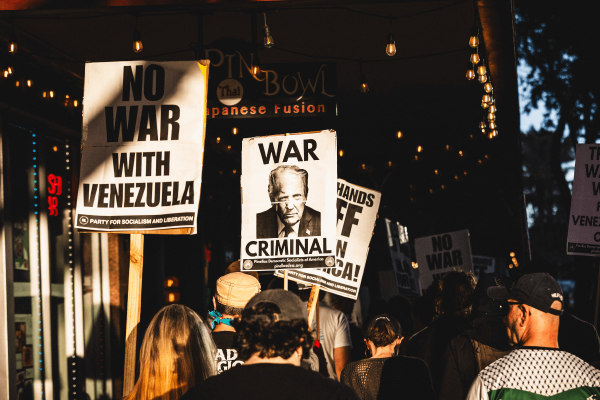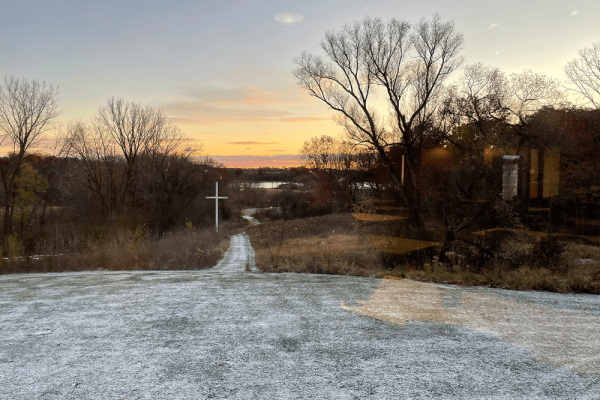Let’s take a quick trip back to the fall of 2016. Justin Bieber, Drake, and Twenty-One Pilots are topping the charts. All the cool kids are bottle-flipping. And almost every adult I know is falling in line to vote for Donald Trump. I’m from the western side of Michigan, and my home county went to Trump by almost 30 percentage points.
I was just starting to develop political opinions at that time, but it shocked me how so many people—who I knew cared deeply about their own moral lives—could countenance voting for a candidate who made a mockery of Christian values like forgiveness and marital fidelity.
On Nov. 14, more than 100 clergy gathered to raise their voices to demand the closure of the Immigration and Customs Enforcement processing facility in Broadview, Ill., the release of all detainees, and that the Department of Homeland Security honor federal law by allowing detainees spiritual care.
The Trump administration is blowing boats to pieces off the coast of Venezuela.
At different points this year, I’ve been left with the unsettling feeling that I don’t have the emotional bandwidth to fully process—let alone respond to—all of what’s happening. Early in the year, we all acknowledged that this overwhelmed feeling was by design, part of the Trump administration’s “flood-the-zone” strategy, intended to weaken and divide its opposition.
I’ve been wrestling with this in light of the attacks the Trump administration is orchestrating in Venezuela. On one hand, I’m perplexed at why such a costly, unlawful, and frankly evil operation isn’t garnering louder public outcry; on the other hand, I know there is so much else on people’s minds. It’s not that we don’t care about it all—from Chicago to Palestine to Sudan to so many other places where we know there’s urgent suffering—but there’s only so much outrage we can process before weariness takes over.
And yet I can’t ignore what’s happening in Venezuela
On the cover art of her latest album, Lux, Spanish superstar Rosalía poses in a white nun’s habit, arms bundled to suggest straight-jacket confinement or maybe self-love. Before anyone heard a note of the new music, the internet was already bubbling over with commentary, par for the course when it comes to the complicated pop auteur. Fans and haters alike wondered what the Catholic imagery might mean. Habit aside, had Rosalía gone tradwife? Even Ikea joined in on the pre-release conversation, posting a version of the album cover with an overhead lamp. In Latin, Lux means light.
The album is a visionary landmark in pop music. Largely departing from previous forays into flamenco fusion and experimental reggaeton, Rosalía primarily draws from the classical tradition for the project, recording with the London Symphony Orchestra and pushing her voice into new operatic territory. Oh, and she sings in 13 different languages.
Chicago is in a state of holy rage. Last Friday morning, I stood with many of my colleagues in ministry at a multifaith service outside the Immigration and Customs Enforcement processing facility in Broadview, Ill. It would be better to call this facility an abduction center, as those who are detained there have little to no contact with the outside world.
The most terrifying thing about power isn’t the force it applies; it’s the moral vacuum it creates in the soul of the person wielding it.
I think of the times I’ve made choices that were professionally powerful but ethically hollow—the quick decision that saved time but neglected a vulnerable party, the project that elevated my status but buried someone else’s contribution. We’ve all been Victor Frankenstein, playing God with a Promethean flame, only to be horrified when the fire scorches someone else.
Every age of Christian art has wrestled with power. From the earliest icons to contemporary murals and prints, artists have used sacred imagery to question authority, confront injustice, and call the church to stay accountable to its own ideals. As chaplain Federico Cinocca writes, protest art can serve as “a precious ally to help theology in its [critical] role and uncover narratives that reinforce marginalization.”
In early 2024, filmmaker Sepideh Farsi felt compelled to document life in Gaza. Ultimately, she couldn’t gain access to the Strip, but she connected with a photographer who’d lived all 25 years of her life there: Fatma Hassona.
The documentary Put Your Soul On Your Hand and Walk is almost entirely composed of their monthslong correspondence. Farsi weaves Hassona’s portraits of an increasingly battered Gaza between a steady exchange of audio messages, spotty video calls, and text messages.
The United States Conference of Catholic Bishops has issued a rare condemnation of President Donald Trump's immigration crackdown and advocated for “meaningful immigration reform.”
“We are troubled by threats against the sanctity of houses of worship and the special nature of hospitals and schools,” the bishops said in a special message, the first of its kind in 12 years.
In early November, a group of faith activists gathered to discuss the future of the Catholicism and feminism.
The Women-Church Convergence, a historic coalition dedicated to justice in social and ecclesial structures, hosted 14 women and nonbinary people from across the country at Mount Olivet Conference and Retreat Center in Minnesota. As the organization begins to sunset, the gathering discussed how to make sure younger Catholic-rooted feminists are supported in their work.







